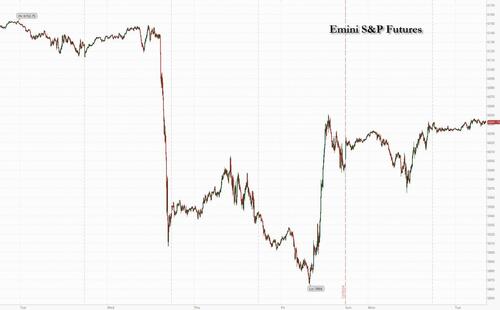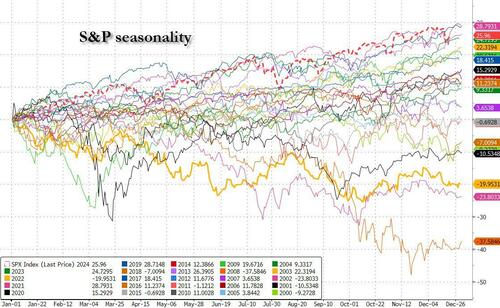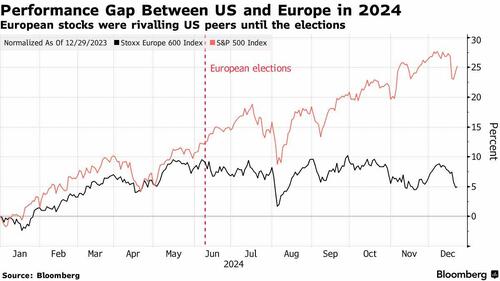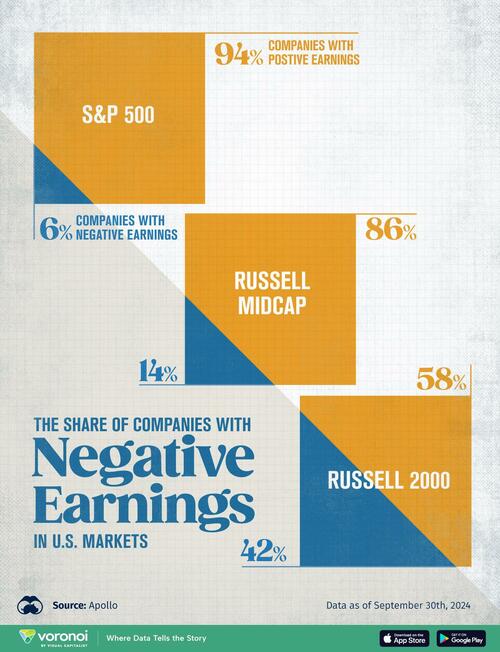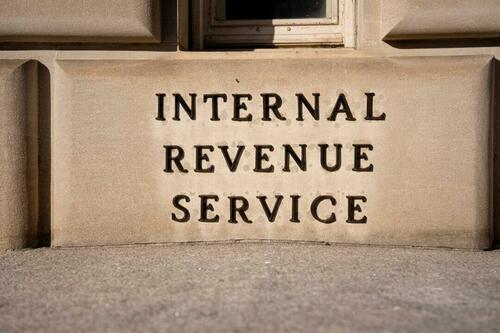10 New Ideas To Make America’s Economy Great Again In 2025
Authored by Stephen Moore via PJMedia.com,
Here’s my wish list for the incoming Trump administration to make America healthy and prosperous and great again in 2025.
1. Slash Job-Killing Regulations
The regulatory state is a $2 trillion tax on the American economy. We all want worker safety, a clean environment and consumer protections, but in too many cases the costs of regulations far outweigh the societal benefits. President-elect Donald Trump has promised to slash 10 rules for every new rule. Just do it, Mr. President.
2. Make the Trump Tax Cuts Permanent
As JFK, Ronald Reagan and others have proven throughout history, lower tax rates lead to more growth, more investment and more jobs. The Trump tax cuts meant that a typical family of four earning $75,000 a year saw their tax bill fall by half — a benefit valued at more than $2,000. And the corporate tax rate fell from 35% — the highest in the world — to 21%, bringing jobs and capital to America. Trump has promised to make all these tax cuts permanent. Why? Because they worked almost exactly as we anticipated they would.
3. Replace Welfare With Work
Growth will require more able-bodied Americans getting off welfare and into jobs. Welfare — which includes cash assistance, public housing, food stamps, disability payments, unemployment benefits and Medicaid — needs to be a hand up, not a handout.
4. Use America’s Abundant Natural Resources
America has well more than $50 trillion of natural resources that are accessible with existing drilling and mining technologies. This is a vast storehouse of wealth that far surpasses what any other nation is endowed with. We can use the royalty payments and leases to reduce our national debt while creating hundreds of thousands of jobs.
5. Cut Medical Costs by Demanding Health Care Price Transparency
One of many ways to bring health care costs down to consumers (and taxpayers, who pay half the costs) is to require hospitals, pharmacies, doctors and health clinics to list prices for what they are charging. The Committee to Unleash Prosperity estimates that $1 trillion to $2 trillion could be reduced from health care costs, with no reduction in the quality of care, by allowing consumers to shop around on the internet for the best price — just as we do when we buy groceries, a home or a car. This will foster free market competition and lower prices.
6. Allow School Choice for All Families
Test scores in America have been plummeting. Kids are graduating from high school — if at all — without even being able to read the diploma. America no longer ranks in the top 10 in many academic achievement ratings.
A child can get a better education at HALF the cost in the Catholic school system and in many charters.
Trump has endorsed universal school choice for ALL children regardless of income or ethnicity or race. This is the civil rights issue of our time.
7. Implement a Pro-America Immigration Policy
Trump’s committed to securing our border, but we also need legal immigrants through a merit-based immigration system. This visa system would select immigrants based on their skills, talents, investment capital, English language ability and education level. These characteristics all presage success in America.
8. Revive America’s Great Cities
Our once-great cities in America — from New York to Chicago to Detroit to San Francisco to Seattle — have come to look like war zones. Crime has run rampant. Businesses and people and capital are fleeing and leaving the poorest Americans — mostly minorities — stranded with tragically limited opportunities other than working at Walmart or McDonald’s for minimum wage. Since 2020, our major cities have lost nearly 1 million residents. And tens of thousands of businesses.
Trump wants to revitalize our cities and abandoned rural areas through deregulation, reduction in tax rates, changes in zoning policies and infrastructure investments.
9. Pull the U.S. Out of the Paris Climate Change Treaty and Other Anti-America Agreements
We must end American participation in globalist treaties that hurt America most. This includes the Paris Climate Accords — a treaty with which most other nations have failed to comply, yet which places huge burdens on American companies and workers. Trump also has pledged to end global taxation — such as Treasury Secretary Janet Yellen’s global minimum tax. Do we even need a United Nations?
10. Finally, Drain the Swamp
There is a reason why three of the five wealthiest counties in America are in or around Washington, D.C. Washington is getting rich at the expense of the rest of us. Fewer than 10% of overpaid federal workers (of which there are more than 2 million) are working full time in the office even though COVID-19 ended three years ago. These are swamp employees that often get paid $150,000 or more a year. Fire them if they don’t show up. And relocate federal agencies in other cities.
These are admittedly bold aspirations for an economic transformation toward freedom and free enterprise. But the one person who can get it done is Trump.
Tyler Durden
Tue, 12/24/2024 – 08:40
via ZeroHedge News https://ift.tt/jJqp3Oc Tyler Durden

